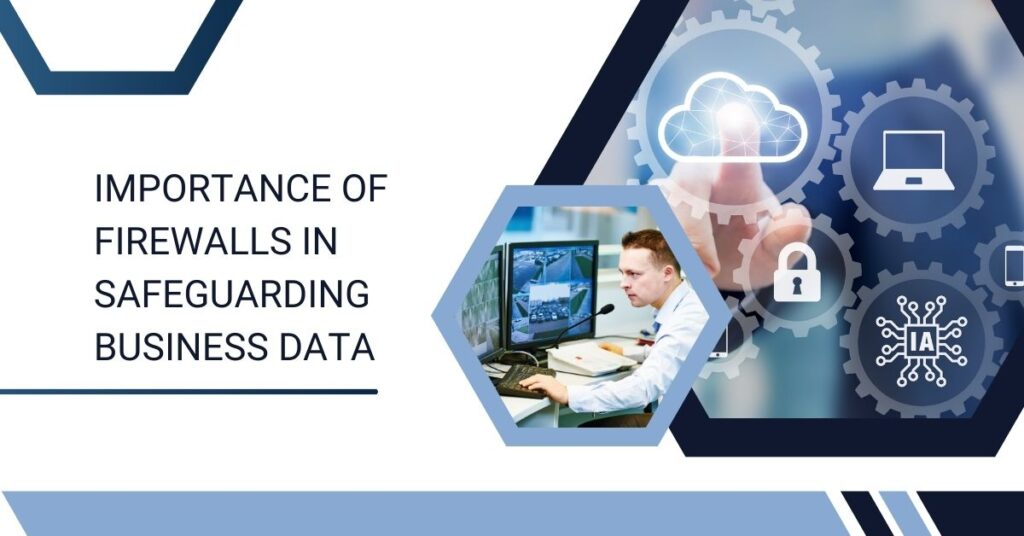Importance of Firewalls in Safeguarding Business Data
In today’s interconnected digital landscape, businesses face an ever-growing array of cybersecurity threats. From sophisticated hackers to malicious malware, the risks are abundant and ever-evolving. Amidst this backdrop, firewalls stand as a fundamental line of defense, playing a pivotal role in protecting business assets, data integrity, and operational continuity. In this comprehensive guide, we delve into the crucial importance of firewalls for businesses, exploring their functionalities, benefits, and best practices.
What is Firewall?
The firewall acts as a barrier between a trusted internal network and untrusted external networks, such as the Internet. It monitors and controls incoming and outgoing network traffic based on predetermined security rules, effectively acting as a gatekeeper to filter out potential threats.
The Importance of Firewalls for Businesses
Preventing Unauthorized Access:
Firewalls prevent unauthorized access to your business network by scrutinizing incoming traffic and blocking suspicious or malicious content. By enforcing access control policies, firewalls ensure that only legitimate users and approved devices can access sensitive company resources.
Protecting Against Cyber Threats:
In today’s digital landscape, businesses are constantly under siege from cyber threats ranging from viruses and malware to phishing attacks and ransomware. Firewalls serve as a critical line of defense against these threats, detecting and blocking malicious activities before they can compromise your network infrastructure or sensitive data.
Safeguarding Data Integrity:
Data is the lifeblood of modern businesses, and protecting its integrity is paramount. Firewalls help maintain data integrity by preventing unauthorized alterations, deletions, or exfiltration attempts. By monitoring data traffic and enforcing encryption protocols, firewalls mitigate the risk of data breaches and ensure compliance with data protection regulations.
Ensuring Business Continuity:
Downtime can spell disaster for businesses, resulting in lost productivity, revenue, and customer trust. Firewalls play a crucial role in ensuring business continuity by mitigating the impact of cyber attacks, such as Distributed Denial of Service (DDoS) attacks, which can overwhelm networks and disrupt operations. By proactively blocking malicious traffic, firewalls help maintain network availability and uptime.
Facilitating Regulatory Compliance:
Many industries are subject to stringent regulatory requirements governing data security and privacy, such as the Health Insurance Portability and Accountability Act (HIPAA) or the General Data Protection Regulation (GDPR). Firewalls play a vital role in facilitating regulatory compliance by implementing necessary security controls, monitoring network activity, and generating audit logs for compliance reporting purposes.
Best Practices for Firewall Implementation
Customize Security Policies:
Tailor firewall rules and policies to align with your business objectives, network architecture, and security requirements. Implement a defense-in-depth strategy by combining multiple layers of security controls, including firewalls, intrusion detection systems (IDS), and endpoint protection solutions.
Regular Updates and Patch Management:
Keep your firewall software up to date with the latest security patches and firmware updates to address known vulnerabilities and mitigate emerging threats. Establish a proactive patch management process to ensure timely deployment of security updates without disrupting business operations.
Continuous Monitoring and Analysis:
Implement robust monitoring and logging mechanisms to track network activity, identify suspicious patterns, and respond to security incidents promptly. Leverage firewall logs and analytics tools to gain visibility into network traffic and user behavior, enabling proactive threat detection and incident response.
Employee Training and Awareness:
Educate employees about the importance of firewall security, cyber hygiene best practices, and social engineering awareness. Foster a culture of cybersecurity awareness by conducting regular training sessions, phishing simulations, and security awareness campaigns to empower employees to recognize and report potential threats.
Regular Security Audits and Assessments:
Conduct periodic security audits and assessments to evaluate the effectiveness of your firewall configuration, identify potential security gaps or misconfigurations, and address any compliance deficiencies. Engage third-party security experts to perform comprehensive penetration testing and vulnerability assessments to uncover hidden vulnerabilities and strengthen your defenses.
Conclusion
In an increasingly digitized and interconnected business environment, the importance of firewalls for businesses cannot be overstated. By serving as a critical line of defense against cyber threats, firewalls help safeguard business assets, data integrity, and operational continuity. By adopting best practices for firewall implementation and maintenance, businesses can fortify their defenses, mitigate risks, and stay resilient in the face of evolving cybersecurity challenges. Invest in firewall security today to protect your business and preserve its future prosperity.
Do you need help with IT-related services? AGN IT Services stands out as the best choice for all your IT needs. Elevate your business with the best IT support services in Dubai. Connect with us today!
Share this post if you find it useful –



